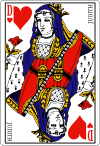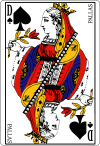Queen (playing card)
The queen is a playing card with a picture of a woman on it. In many European languages, the king and queen begin with the same letter so the latter is often called dame (lady) or variations thereof. In French playing cards, the usual rank of a queen is between the king and the jack. In tarot decks, it outranks the knight which in turn outranks the jack.

In several card games, including the middle eastern Trex and French Barbu, the queen is a major card to avoid taking, with each queen taken inflicting a penalty on the player. Similarly, in Hearts, the queen of spades is to be avoided, and is called a variety of unsavoury names.
In the Paris pattern, each court card is identified as a particular historical or mythological personage as follows:[1][2]
| Hearts | Diamonds | Spades | Clubs |
|---|---|---|---|
 |  |  |  |
| Judith, Biblical figure | Rachel, Biblical figure | Pallas, an epithet of the goddess Athena | Argine, an anagram of Regina (Latin for "queen") |
Cultural references
Regarding the anonymous nursery rhyme, "The Queen of Hearts" (published 1782), Katherine Elwes Thomas claims, in The Real Personage of Mother Goose, that the Queen of Hearts was based on Elizabeth of Bohemia.[3] Benham, in his book Playing Cards: History of the Pack and Explanations of its Many Secrets, notes that French playing cards from the mid-17th century have Judith from the Hebrew Bible as the Queen of Hearts.[4] See also: Queen of Hearts (Alice's Adventures in Wonderland).
See also
- List of poker hand nicknames
- Three-card Monte
References
| Wikimedia Commons has media related to Queens (playing cards). |
- "The Four King Truth" at the Urban Legends Reference Pages
- Who are the court figures? at the International Playing-Card Society. Retrieved 22 October 2016.
- Thomas, Katherine Elwes (1930). The Real Personage of Mother Goose. Lothrop, Lee & Shepard Co. [ISBN unspecified].
- "Eclipse :: Mother Goose". School of Communication, Information and Library Studies, Rutgers University. Retrieved 29 July 2009.